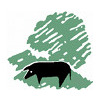Calendar
8th International Symposium on the Mediterranean Pig


The symposium of Mediterranean pig is an event that is organized every three years and represents a network of researchers working in the field of pig breeding in the regions/countries surrounding the Mediterranean. The ambition of the network, from its creation, is to represent an alternative to modern intensive systems of pig production. The special emphasis has thus been given to less intensive (low input) systems of pig breeding and/or to the autochthonous and traditional breeds as the source for traditional and high quality products. Dry-cured ham, for many countries, is the most important product, but there are other pork products, such as shoulder, pancetta, bacon, sausages, also popular among consumers.
The link between local breed, geographical area and a product is the basis for the success of many commercial strategies in those Mediterranean countries which have decided to adopt the policies for the recovery of their local pig breeds. The examples of good practices can be seen in Spain or Portugal, where the traditional local pigs (Iberico in Spain, Alentejano in Portugal), kept in special agro-silvo-pastoral ecosystems (“dehesa” in Spain, "montado" in Portugal), not only give meat products of special quality, but help to preserve the landscape and agricultural activity. Most of the breeds native to Mediterranean come from small populations and are reared in geographical areas where the availability of natural resources is not always assured. Moreover, these breeds require collective management to avoid inbreeding and to assure breed preservation. This is one of the critical points for the future because most of the local breeds are presently not managed in a secure way. Development of the sector of high quality products is a way to ensure the preservation of traditional breeds. Successful examples were possible due to a fruitful cooperation between public institutions, producers and scientists and thanks to this synergy products have become popular. Good examples of such synergy can also be found in Italy (e.g. Cinta Senese and Nero Siciliano) or France (e.g. Corsican Nustrale, Porc Basque) or Portugal (Bísaro). In other countries like Croatia and Slovenia the preservation programmes for local breeds have been established however the economic potential of local or traditional breeds or rearing systems in pig production is far from being optimally exploited and represents a challenge and opportunity of pig sector for the future.
Until now, the meetings of the researchers interested in the aspects of traditional pig/pork production in the Mediterranean area have been held since 1987 under the form of International Symposiums on the Mediterranean Pig in Ajaccio (France, 1987), Badajoz (Spain, 1992), Benevento (Italy, 1995), Évora (Portugal, 1998), Tarbes (France, 2004), Capo d’Orlando (Italy, 2007) and Cordoba (Spain, 2010). On the last three occasions the symposium has been enriched by the participation of new countries surrounding the Mediterranean (i.e. Slovenia and Croatia). Slovenia agreed to host the 8th Symposium, to be held 10-12 October 2013 in Ljubljana.
INVITED LECTURES (Section, approximative title of lecture, lecturer)
Breeding, genetics
- Conservational issues in autochtonous breeds - state of the art (Riccardo BOZZI et al.)
- Molecular genetics of coat colour in pigs (Luca FONTANESI & Vinzenzo RUSSO)
Feeding, management
- Feeding strategies for autochtoneus breeds in view of product quality (Oreste FRANCI & Carolina PUGLIESE)
- Inventory/diversity of housing systems in rearing of local breeds (João Paulo Peres DOS SANTOS e SILVA)
Meat quality
- Novel technologies for characterisation, quality assurance and traceability (Jorge RUIZ et al.)
- Diversity and quality of traditional meat products in Mediterranean area (Monica FLORES et al.)
Health
- Sanitary aspects of outdoor farming systems (Krešimir SALAJPAL et al.)
Marketing, sustainability, environment
- Application of quality labels for product valorisation and conservation of autochtonous breeds - a challenge for Slovenian local pig Krškopolje (Špela MALOVRH et al.)
- Comparison of rearing systems for environmental impact (Jean-Yves DOURMAD & François CASABIANCA)
SCIENTIFIC PROGRAM (PRELIMINARY)
Thursday 10th October
08.30 - 09.30 Registration of participants
09.30 - 10.00 Opening ceremony
Session 1. Genetics
10.00 - 10.30 Plenary lecture I
10.30 - 11.00 Plenary lecture II
11.00 - 11.30 Coffee Break
11.30 - 12.30 Oral communications
12.30 – 14.00 Lunch
Session 2. Feeding management
14.00-14.30 Plenary lecture I
14.30-15.00 Plenary lecture II
15.00- 16.00 Oral communications
16-00 – 17.00 Poster sessions 1 and 2
20.00 Slovenian dinner
Friday 11th October
Session 3. Meat quality
9.30-10.00 Plenary lecture I
10.00- 10.30 Plenary lecture II
10.30-11.00 Coffee Break
Session 4. Health
11.00- 11.30 Plenary lecture I
11.30 – 12.30 Oral communications
12.30 – 14.00 Lunch
Session 5: Marketing, sustainability and environment
14.00-14.30 Plenary lecture I
14.30-15.00 Plenary lecture II
15.00- 16.00 Oral communications
16-00 – 17.00 Poster sessions 3, 4 and 5.
17.00 - 17.30 Closing Conference
Saturday 12th October – Agroturism & Symposium on dry-cured ham - AGROTUR
08.00 Departure to region Kras
09:00 - 15:00 Symposium on dry-cured ham - AGROTUR http://www.agrotur.si/en/predstavitev-projekta.html
Presentation of Interreg Italy-Slovenia project Agrotur (dr. Klemen LISJAK, KIS-Agic Inst Slovenia)
Salt intake and health, perspectives in view of dry-cured ham (dr. Sabina PASSAMONTI, Univ Trieste)
How pig breeding factors affect salt content (intake) - consequences for dry-ham quality and consumer attitude (Marjeta ČANDEK-POTOKAR & Martin ŠKRLEP)
Visit of local agroturistic farm(s) and degustation of local products, in particular dry-cured ham Kraški pršut and wine Teran
